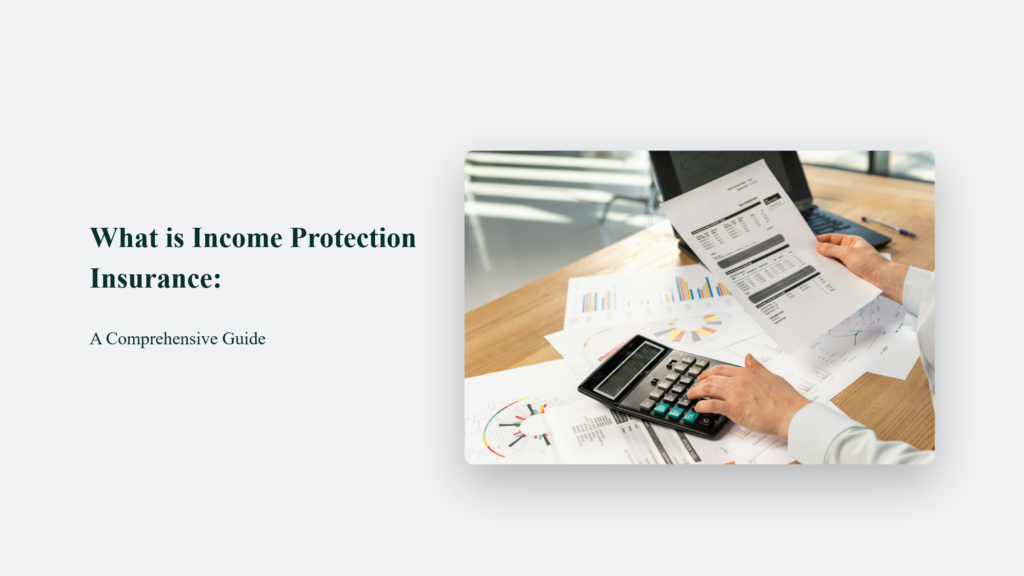

What is Income Protection Insurance: A Comprehensive Guide

As Seen On
Welcome to CJ&CO, the Gold Coast Digital Marketing Agency, where we thrive on making the complex simple. Today, we’re diving into what income protection insurance is. Imagine this: you’re in the prime of your career, juggling life’s many demands, when suddenly, an unexpected illness or injury presses the pause button on your income.
That’s where income protection insurance comes into play, acting like a financial safety net. Let’s unfold the what, why, and how of this crucial yet often overlooked insurance.

What is Income Protection Insurance:
Understanding income protection insurance is essential for anyone who relies on their income to meet financial obligations and maintain their standard of living. This type of insurance serves as a financial safety net, offering support if you cannot work due to illness or injury. It replaces a significant portion of your income, ensuring you can meet your financial commitments and maintain your lifestyle during recovery.
Income protection insurance offers flexible coverage options tailored to individual needs, allowing you to choose factors like the waiting period (the duration between your claim and the start of benefit payments), benefit amount, and payment duration. These policies can be customized to align with your financial goals and obligations. Regularly reviewing your policy is crucial to ensure it remains adequate, especially if your income, occupation, or circumstances change.
The Inner Workings of Income Protection Insurance:
Income protection insurance operates as a financial safeguard, providing regular payments to replace a part of your income if you cannot work due to illness or injury. Typically, these payments are capped at around 70% of your normal income. For example, if your monthly pre-tax income is $5,000, you could receive approximately $3,500 under this insurance.
The process to claim these benefits involves serving a waiting period, which is the time between your first day off work and when you’re eligible to claim. This waiting period is usually between 2 weeks and 3 months and can be selected when you take out the policy. It’s important to note that the shorter the waiting period, the higher the policy cost.
To receive payments, you must prove that your inability to work is due to illness or injury, typically through doctor’s notes and possibly communication with your employer. After passing the waiting period and providing necessary proof, you will receive monthly payments from your insurer, intended to help cover everyday household bills while your income-earning ability is impacted.
Income protection insurance can be claimed as many times as needed while the policy is in force. There’s often a deferred period before payments start, and the most common waiting periods are 4, 13, 26 weeks and a year. Choosing a longer waiting period can result in lower monthly premiums. It’s also important to remember that this type of insurance is distinct from critical illness insurance, which provides a one-off lump sum for specific serious illnesses.
The cost of income protection insurance depends on the policy and individual circumstances. Factors like the percentage of your income you want to protect, the policy’s duration, and the nature of your job influence the premiums.
Income protection insurance is a sensible option for almost everyone, especially for those who depend on a regular income and would struggle financially if unable to work. It is particularly beneficial for self-employed individuals who don’t have sick pay to fall back on.
Glimpse into Policy Types:
Income protection insurance offers various types to cater to different needs and circumstances. Here’s a brief overview:
Short-term Income Protection:
This type covers you for a specified period, typically up to two years. It’s ideal for those in seasonal jobs or with sufficient savings for emergencies. The waiting periods before payouts start are usually shorter, but premiums might be higher than long-term plans.
Long-term Income Protection:
This type provides financial compensation for longer periods, often beyond two years, if you cannot work due to illness or injury. It suits individuals without substantial savings or those with conditions that could lead to long-term work absences. These policies have longer waiting periods before payouts begin.
Mortgage Protection Insurance:
Specifically designed for mortgage holders, this policy covers mortgage repayments if you can’t work due to illness, injury, or redundancy. It considers other expenses like utility bills and groceries, offering homeowners a broader financial safety net.
Redundancy Insurance:
It provides financial protection if you lose your job due to layoffs or company restructuring. It’s a fixed payout for a specific period and can be standalone or part of an income protection plan, suitable for those in uncertain job sectors.
Combined Insurance Policies:
These are bundles of different types of coverage, like critical illness and income protection, offering comprehensive financial coverage after an injury or illness. While they provide multiple risk coverage, they tend to be more expensive.

The Eligibility Maze for Income Protection Insurance
When considering income protection insurance, it’s crucial to understand its eligibility criteria. Generally, these policies are designed to offer financial assistance in cases where you cannot work due to illness or injury.
It means you wouldn’t qualify for benefits for reasons other than these specific health-related issues. Notably, instances such as voluntary resignations or incapacity resulting from drug or alcohol intoxication, criminal acts, war, or pregnancy are typically excluded.
Moreover, different types of income protection policies may have varying eligibility criteria. It’s essential to be as accurate and honest as possible when applying, as most rejected claims are often due to misrepresentation or inaccurate health and lifestyle information.
Advantages: Why Consider Income Protection Insurance?
Income protection insurance is an important financial tool that offers multiple benefits, ensuring peace of mind and financial security, especially during unexpected health issues. One of the key advantages of income protection insurance is that it continues to provide a portion of your regular income, typically up to 70%, when you’re unable to work due to illness or injury.
It ensures that you can maintain your standard of living and meet financial obligations without dipping into your savings or scrambling to make ends meet.
Moreover, income protection insurance can be customized to suit individual needs. You can choose your coverage level, the waiting period before benefits kick in, and the duration you’ll receive benefits. This flexibility allows you to tailor the policy to your financial situation and coverage requirements.
One of the most appealing features of income protection insurance is the tax-deductible nature of the premiums, at least for policies outside of superannuation. It provides financial relief and adds an extra benefit to the policyholder. The claims process is also typically straightforward, aiming to minimize stress during difficult times.
Income protection insurance also covers self-employed individuals, who often don’t have access to employer-provided sick pay or benefits. It makes it a vital safety net for freelancers and entrepreneurs.
Do You Need Income Protection Insurance?
Whether you need income protection insurance depends on your financial situation and career. Here are some key considerations to help you assess whether this insurance is right for you:
- Nature of Your Work and Risks Involved: If your job is high-risk or involves manual labour, you might be more prone to injuries, making income protection insurance a sensible choice.
- Financial Obligations: Consider your financial commitments, like mortgages or loans. Income protection insurance can be invaluable in ensuring you can meet these obligations if you are unable to work due to illness or injury.
- Existing Savings and Emergency Funds: This insurance can provide a financial safety net if you don’t have substantial savings or an emergency fund.
- Family Dependents: If you’re the main breadwinner, income protection can secure financial stability for your dependents.
- Health Status and Medical History: Your health and medical history can influence the necessity and cost of the insurance. Pre-existing conditions might affect your eligibility and premium rates.
- Comparison with Other Insurances: Income protection insurance differs from critical illness coverage or life insurance. It provides a replacement income if you cannot work, unlike critical illness cover, which pays a lump sum for specific diagnoses, or life insurance, which provides for your dependents after your death.
- Costs and Premiums: The cost of income protection insurance varies based on factors like age, health, job risk, and the length of the policy. Typically, premiums are higher for older individuals, those in high-risk jobs, or smokers.
- Employer’s Sick Pay Provisions: You might not need additional income protection if your employer provides comprehensive sick pay. However, it’s crucial to understand the extent and duration of this coverage.
Income protection insurance is wise if you have significant financial obligations, lack substantial savings, or have a family to support. It ensures that you can maintain your standard of living and meet financial commitments even when you can’t work due to health issues.
However, it’s important to carefully consider your circumstances and needs before deciding.
The Bottom Line:
In conclusion, income protection insurance is like having a financial parachute, ensuring you land safely during unforeseen health challenges. It’s about expecting the unexpected and being prepared for life’s curveballs. Remember, the best time to consider income protection insurance is when you least expect to need it. Stay informed, stay protected!
Konger
Up until working with Casey, we had only had poor to mediocre experiences outsourcing work to agencies. Casey & the team at CJ&CO are the exception to the rule.
Communication was beyond great, his understanding of our vision was phenomenal, and instead of needing babysitting like the other agencies we worked with, he was not only completely dependable but also gave us sound suggestions on how to get better results, at the risk of us not needing him for the initial job we requested (absolute gem).
This has truly been the first time we worked with someone outside of our business that quickly grasped our vision, and that I could completely forget about and would still deliver above expectations.
I honestly can’t wait to work in many more projects together!
Disclaimer
*The information this blog provides is for general informational purposes only and is not intended as financial or professional advice. The information may not reflect current developments and may be changed or updated without notice. Any opinions expressed on this blog are the author’s own and do not necessarily reflect the views of the author’s employer or any other organization. You should not act or rely on any information contained in this blog without first seeking the advice of a professional. No representation or warranty, express or implied, is made as to the accuracy or completeness of the information contained in this blog. The author and affiliated parties assume no liability for any errors or omissions.

